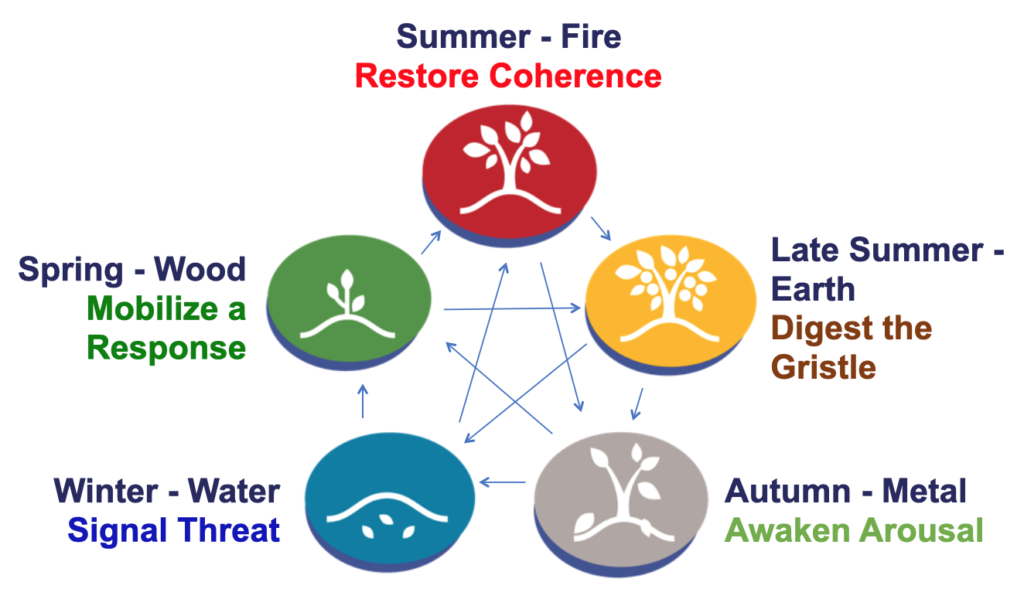Trauma Training Tip
This could not be a better time to offer some thoughts on cultivating cultural transformation through healing. Our world, our nation, our communities are being called to work from our biggest minds and broadest consciousness to craft actions, approaches and relationships that support people walking towards each other, and ultimately to walk with each other, building the world we want to live in.
Collectively we healers touch a broad swath of America – we treat politicians and educators, medical and mental health providers, civil servants, writers, lawyers, policy makers, the people who help institutions serve their constituents, register voters, grow, prepare and deliver food . . . and a whole bunch of the parents and grandparents who tend our children.
I offer you 5 Resource Words, rooted in the vibrations of the 5 Elements, to help you cultivate capacity in your patients to live in diverse and healthy communities. Your patients may need such an experience to root their healing in – and to support the role they are called to play in the many facets of their lives. Help them find an embodied experience – and watch their system move towards regulation. It will give your treatment a rich, fertilized place to land in and grow from.
| Resource Word | Element Enriched | Role in cultivating an embodied and expanded capacity to live in community |
| Respect | Metal | Cultivates a somatically mindful capacity for curiosity in the place of threat when something or someone new appears. |
| Protect | Water | Cultivates capacity to distinguish discomfort from fear. Helps replace habituated fear with embodied awareness of both safety and danger. |
| Encourage | Wood | Builds capacity to pause between stimulus and response. Cultivates a fresh capacity to strategize appropriate responses to protect self and others, uncolored by previous failures of self-protection. |
| Love | Fire | Helps quiet an agitated heart. Helps us know when “it’s over” returning our mind and heart to equanimity, supporting nuanced and more expansive thoughts and relationships. |
| Support | Earth | Helps us digest the gristle remaining from overwhelming experiences, and harvest lessons that expand rather than contract our life. |
Alaine’s Two Cents
There’s a lot of strong feelings in response to the recent election. I have some of them! I am reminded that the most important thing we bring to our treatment rooms is our own regulation.
If you have grief, please allow it to have its expression. The pain of grief can disconnect us from a full range of life experiences, emotions, and memories stored in our bodies. It can make us contract, become rigid and small. Finding places and people with whom we can fully explore our grief just may leave us feeling more alive, more hopeful, and more expressive. The emotion associated with the Fall is grief – all of nature is letting go – and can be our teacher and companion. Curiously, allowing grief to be fully experienced can also open us up hope, love, and joy – and it is critical that we protect our joy!
Don’t let anyone take your joy!
It we over-identify with people who we anticipate will be suffering under Project 2025 policies, we may “spend our wallet” prematurely. We won’t have enough of our own vitality left to protect and defend vulnerable people if the time arises when our privileges are needed to mobilize a response. We also run the risk of being so consumed by a sense of danger or dread that our orientation system is under-coupled to the present moment. We become prone to accident or injury when we lose our present moment, somatic mindfulness.
I also encourage us all to cultivate eyes that can see the many ways that a sense of threat or danger also becomes a deep fertilizer for creativity and artistic expression. We may be on the threshold of a renaissance of connection, expression, and compassion.
I hope so.
Check This Out!

A group of Quaker 6th graders at Adelphi Friends Meeting shared their thoughts about these questions this past Sunday. Sharing them because these are good queries for adults to sit with too!
1. What do you know is true about you? How do you remember to trust yourself even when things are hard
2. Who are the people you trust? Who trusts you?
3. What and who helps you feel and share your sadness, anger, fear, and other feelings?
4. How do you deal with what you can’t change?
5. How do you take care of yourself and other people you love?
6. How do you decide when to obey and when to push back when something is unfair or not right?
7. Who are the people that you might not be friends with, or you might disagree on some things with, but that you know you can still work with when things are hard?
8. Who and what makes you feel powerful? When have you felt powerful and what does it feel like?
9. What can we do to remember we are powerful even when we feel scared?
10. What kind of world can we imagine and build together?
Clinical Curiosity
Where is your clinical curiosity carrying you?
Send me a question or two and I will explore them with readers in this corner next month.
Q: I am an acupuncturist and my patient is a Metal survivor type. Her main complaints all involve her pelvis – or what Chinese medicine would call her “lower jiao.” She has a lot of menstrual pain, urinary frequency and urgency, and pain with sex. While we haven’t directly spoken about experiences of danger or life threat in her pelvis – the vibration of these kinds of experiences is certainly in the room when we are together.
A: So glad she has you! I’m also glad that you haven’t pressed her for content or story behind the many ways her pelvis is talking (or perhaps screaming). You would run the risk of overwhelm and create conditions for even greater brace or collapse were you to ask her to rehearse her traumatic experience.
It may be too volatile for her to be present in her tissues if you were to direct your treatments directly to her pelvis – in spite of the “chalk board” protocols in our textbooks. Trauma survivors don’t always follow the textbooks – and we often need to titrate our ministrations in order to make them more accessible to these patients.
I recommend you begin with distal touch on her respiratory diaphragm. It is a likely spot for a Metal survivor type to be carrying a state of brace or collapse arising from an overwhelming experience in her past. Use a “metal” style touch to make contact – this is a touch with “air” in it – it is delicate and respectful – as if you are holding a rare, valuable and fragile antique vase. It will bring an energetic quality that speaks to what is missing for her. Supporting regulation in the diaphragm above her pelvis will send a regulating message down to her pelvic diaphragm. By engaging her distally, she may be better able to receive the regulating message her pelvis is longing for.

The diaphragm system is a common place we use to help us manage emotional overwhelm. The brace or collapse then influences the adjacent diaphragms and the organs in-between.
Go slow. There is likely some overwhelm stored her diaphragm system. Let her experience enough activation to in turn fuel a de-activation cycle that will support her overall regulation. Once there is more regulation in her pelvis, you can follow up with needles – she will be better able to receive and make use of them!

